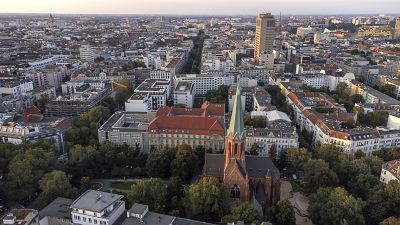Euronews Business examines hiring expectations across 21 European countries, focusing on key industrial sectors.
Public and private employers in Europe are expected to continue hiring in the last quarter of 2024.
While hiring expectations remain positive in all 21 European countries included in the ManpowerGroup Employment Outlook Survey, most countries have seen a decline compared to the same period in 2023.
Experts point to the impact of skill mismatches and slower economic growth as key factors influencing hiring expectations across Europe.
How are hiring expectations measured, and which European countries recorded the highest and lowest rates?
The ManpowerGroup’s survey, conducted with 40,340 employers across 42 global economies, calculates the Net Employment Outlook (NEO), which reflects hiring expectations.
The NEO is derived by subtracting the percentage of employers expecting a decrease in hiring activity from the percentage of those anticipating an increase.
A positive NEO figure indicates that more employers plan to expand their workforce in the next three months than those intending to reduce staff.
Seasonally adjusted hiring expectations in Europe range from 11% in Czechia to 32% in Switzerland, with the average across these 21 countries standing at 20.5%.
Among Europe’s top five economies, the UK recorded the highest hiring expectations at 28%, followed by Germany and France (both at 22%), Spain (20%), and Italy (19%).
Only five European countries ranked above the global average of 25%: Switzerland, the Netherlands, the UK, Ireland, and Belgium.
Different governments with different strategies
“There are wide variances in economic activity, sectoral strength and hiring intentions across Europe, which is not surprising for a large block of countries,” Mara Stefan, ManpowerGroup Vice President of Global Insights, told Euronews Business.
“The situations in different countries across Europe are wildly different including different governments with different strategies to deal with economic, social and international pressures,” she added.
Mara Stefan also highlighted that proximity to conflict causes an uneven response to this uncertainty, too.
“Reliance on energy/fuel is very different, specifically for countries like Germany that have a high reliance on imports and Norway which is more self-sufficient,” she said.
Decline in over half of countries compared to last year
On average, hiring expectations across the 21 European countries dropped by 3.5 percentage points (pp) between Q4 2023 and Q4 2024.
Thirteen out of the 21 countries recorded a year-over-year decline during this period, while only six saw an increase.
Despite an overall decline in the employment outlook across Europe, some countries have experienced a positive shift during this period. Hungary (+5 pp) and Slovakia (+4 pp) saw the largest increases in hiring expectations.
On the other hand, several countries experienced more significant declines. Portugal recorded the steepest drop, with a decline of 16 pp between Q4 2023 and Q4 2024, followed by Sweden (-13 pp), Turkey (-12 pp), Austria (-11 pp), and Finland (-9 pp).
As recession fears subside, companies ease hiring efforts
As to this important change, hiring and employment were key to avoiding recession last year according to Mara Stefan.
She said: “Many companies were hiring to keep growing, and stay ahead of inflation. Equally, workers were moving companies a lot to get better wages to keep up with increasing prices,” she said.
“This meant there was a lot of emphasis on hiring. As the danger of recession recedes, companies are also slowing hiring, not offering higher wages, and so workers are also staying put.”
ManpowerGroup’s Mara Stefan also highlighted that European employers have become more cautious over the last year since Q3 2023 due to a weaker economic and global trade outlook, particularly for export-oriented economies like Germany’s auto sector.
“This has been compounded by ongoing mismatches between the skills workers have and what employers need,” she added.
A positive NEO doesn’t mean there aren’t employers planning reductions. In fact, when examining the details, 18% of European employers expect to reduce their workforce, while 38% anticipate hiring.
As these details are not seasonally adjusted, slight differences may occur compared to the seasonally adjusted figures for hiring expectations mentioned above.
In Switzerland, Norway, the Netherlands, and Ireland, 45% or more of employers expect to hire in the last quarter of this year. On the other hand, Romania leads in expected workforce reductions at 25%, followed by Turkey (23%) and Slovakia (22%).
Hiring expectations vary across key industry sectors
The sectors with the strongest employment outlooks in Europe, the Middle East, and Africa (EMEA) region are information technology (31%) and financials and real estate (28%).
However, this primarily reflects Europe, as the region includes 21 European countries, while the Middle East and Africa are represented by only two: Israel and South Africa.
The sector with the lowest employment outlook is energy and utilities, at 6%. Global figures differ slightly from those in this region.
Among European countries, Belgium reported the strongest hiring expectation for the healthcare and life sciences sector at 62%.
In information technology, the Netherlands posted the highest NEO figure at 49%. Despite the sector having the strongest employment outlook overall, Romania reported negative expectations, with a NEO of -3%.
“The continued strong outlook in the IT sector is driving demand for tech talent, especially with AI top of mind for businesses across every industry,” Jonas Prising, ManpowerGroup Chairman & CEO said.















